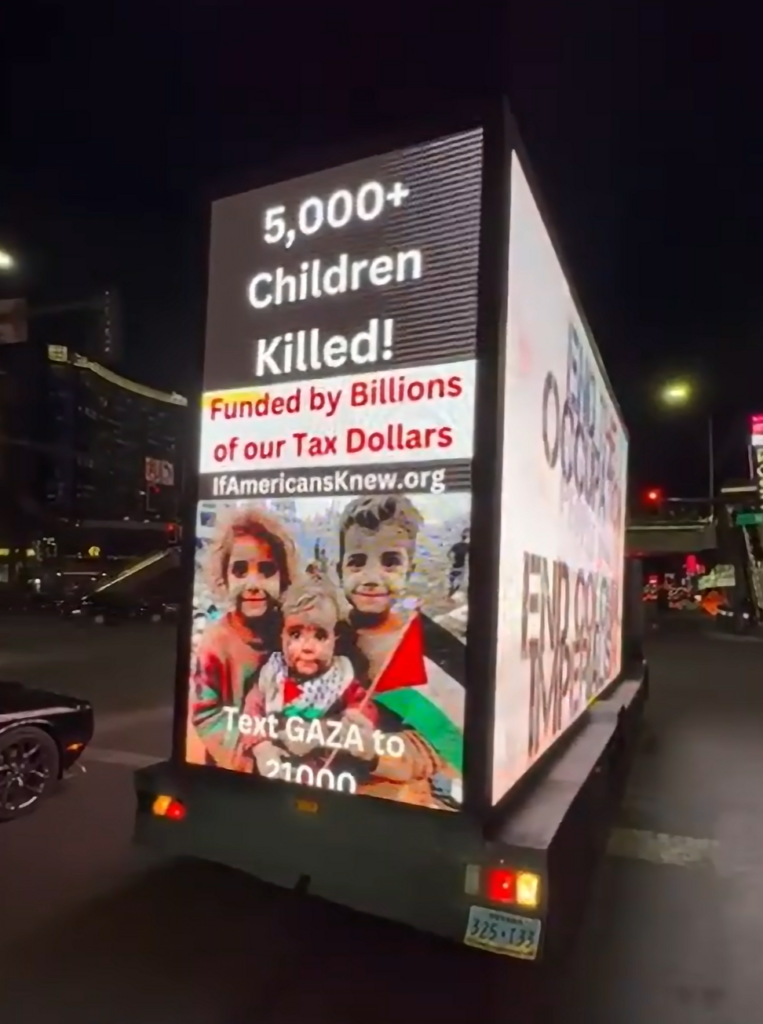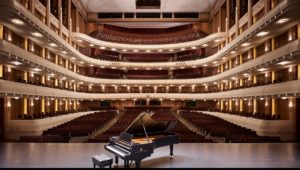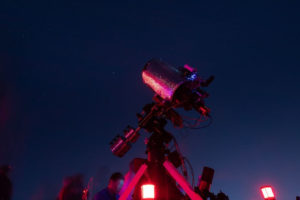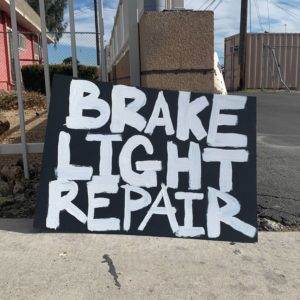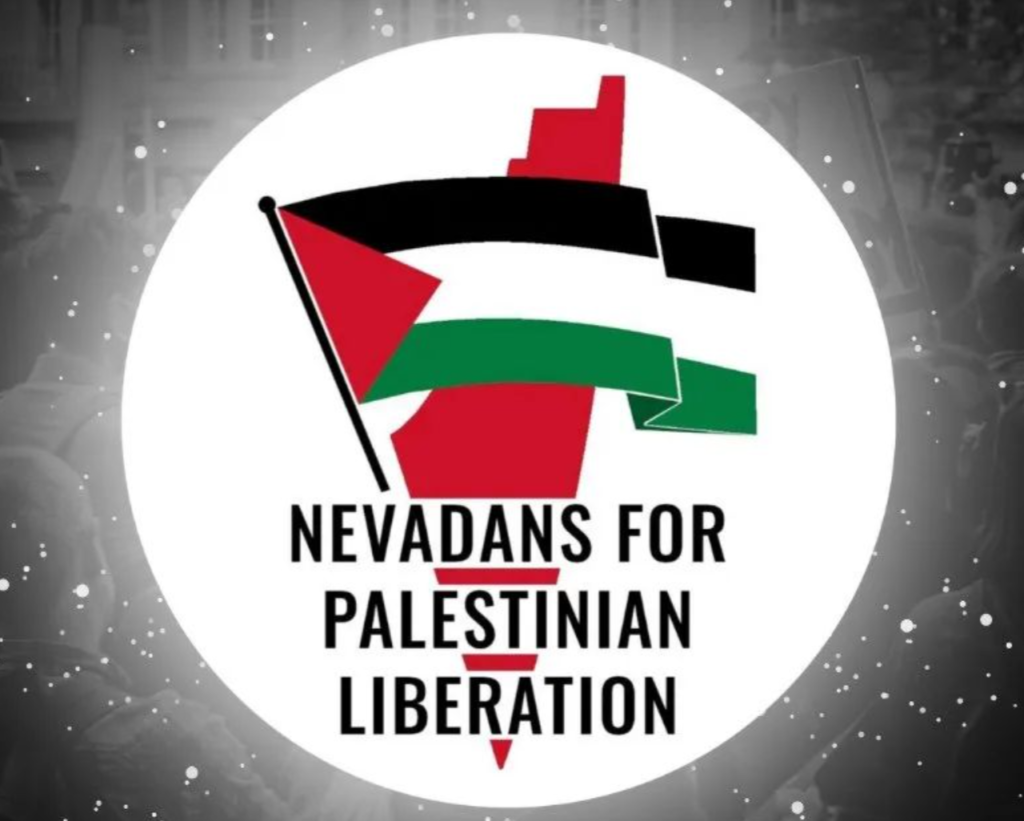
Nevadans for Palestinian Liberation: Life, Liberty, and the Pursuit of a Free Palestine
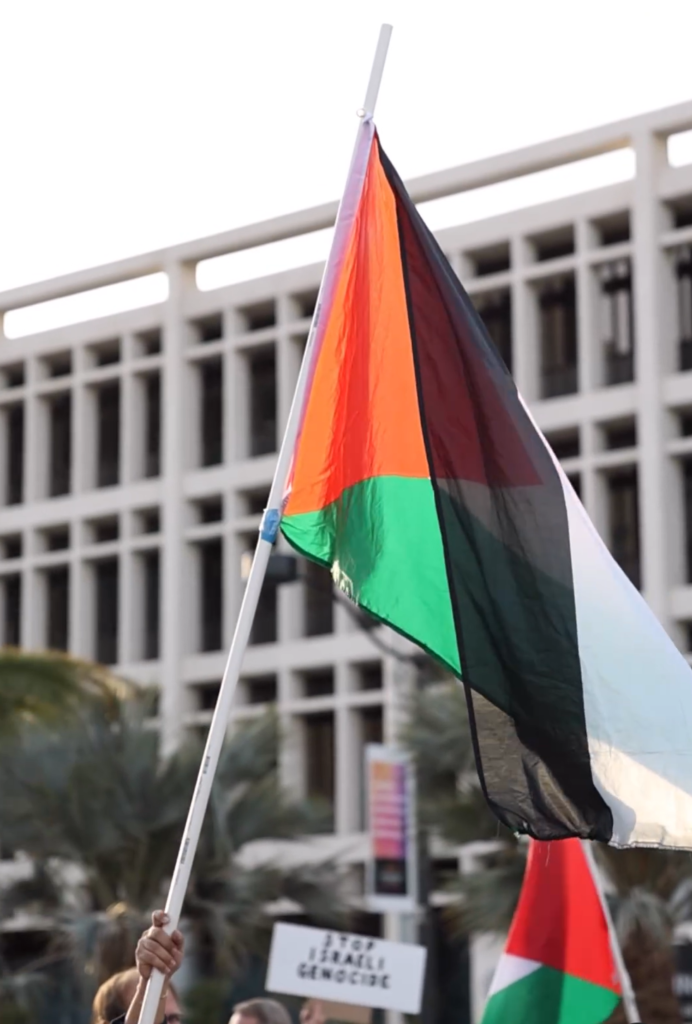
Founded in 2018, Nevadans for Palestinian Liberation (NPL) fights for a free Palestine and educates people about Palestine and its history. With recent events, the organization has been working tirelessly to keep people informed about the ongoing genocide happening in Gaza. Michael, the founder of NPL, shared how the organization came to be.
“We created NPL to advocate for and create awareness and education about Palestine,” he said. “We do this through rallies, film screenings, book clubs, and our student group at UNLV.”
At the time of NPL’s founding, Jewish Voice for Peace – the world’s largest progressive Jewish anti-Zionist organization – had a small presence in Las Vegas. Michael shared that while they shared many of the same principles with JVP, they were not the same. So, he created a Palestinian-led group here in Las Vegas to grow the movement of liberating Palestine and working toward peace in the region.
On the topic of what liberation means to Nevadans for Palestinian Liberation, Michael shared the vision that the organization has regarding a free Palestine: One state that encompasses all of historic Palestine, from the River Jordan to the sea and north from Lebanon to the south in Egypt, where all people – Arabs, Muslims, Jews, and Christians – live together peacefully.
In addition to the one-state solution to liberate Palestine, Nevadans for Palestinian Liberation also calls for the end of the Israeli occupation, the end of the siege and blockade in Gaza, and the stopping of illegal settlements built in the West Bank.
Nevadans for Palestinian Liberation’s Goals: “The Issues of Palestine Don’t Change”
What’s Happening Now vs. What’s Been Happening for Decades
With the ongoing genocide happening in Gaza, Nevadans for Palestinian Liberation’s primary focus is addressing what is actively occurring right now. However, Michael pointed out that this did not start on October 7.
“The issues of Palestine don’t change. Whether we’re talking about right now, five or ten or 75 years ago, the objectives [remain] the same,” he said. “At the first protest we held after October 7th, I could‘ve used the same speech that I used five years ago at a previous protest because it’s all the same.”
Michael also spoke about the difficulty of doing all of this on repeat.
“Every time this hits mainstream news, and Palestine is trending, we as Palestinians have to reduce the history down again for people to explain to them about why they need to care or why this is happening,” he said.
Reaching More People in the Community & Providing More Education
According to Michael, Vegas is a unique city for Palestinian advocacy.
“We don’t have many options for direct action that other places do, like protesting outside embassies or blocking shipments in ports,” he said. To build advocacy, NPL instead focuses on awareness about Palestine’s plight, education about its history, and appreciation for its culture.
“We want to establish a broader group to focus on the cultural aspect of Palestine and Palestinian people and introduce the culture to the rest of the community,” Michael explained. To combat the decades-long goal of dehumanizing Palestinian people, NPL wants to humanize them by teaching people about Palestinian culture through their art, food, dance, and more.
In addition, Michael shared that part of NPL’s overall goal is to have a Registered Student Organization at UNLV that is student-led. Going into next year, NPL plans for a lot of growth.
“We want to capitalize on the enthusiasm of the students and the momentum we are building,” he said. Nevadans for Palestinian Liberation is currently looking for a new president for its UNLV chapter.
Keeping the Momentum Going
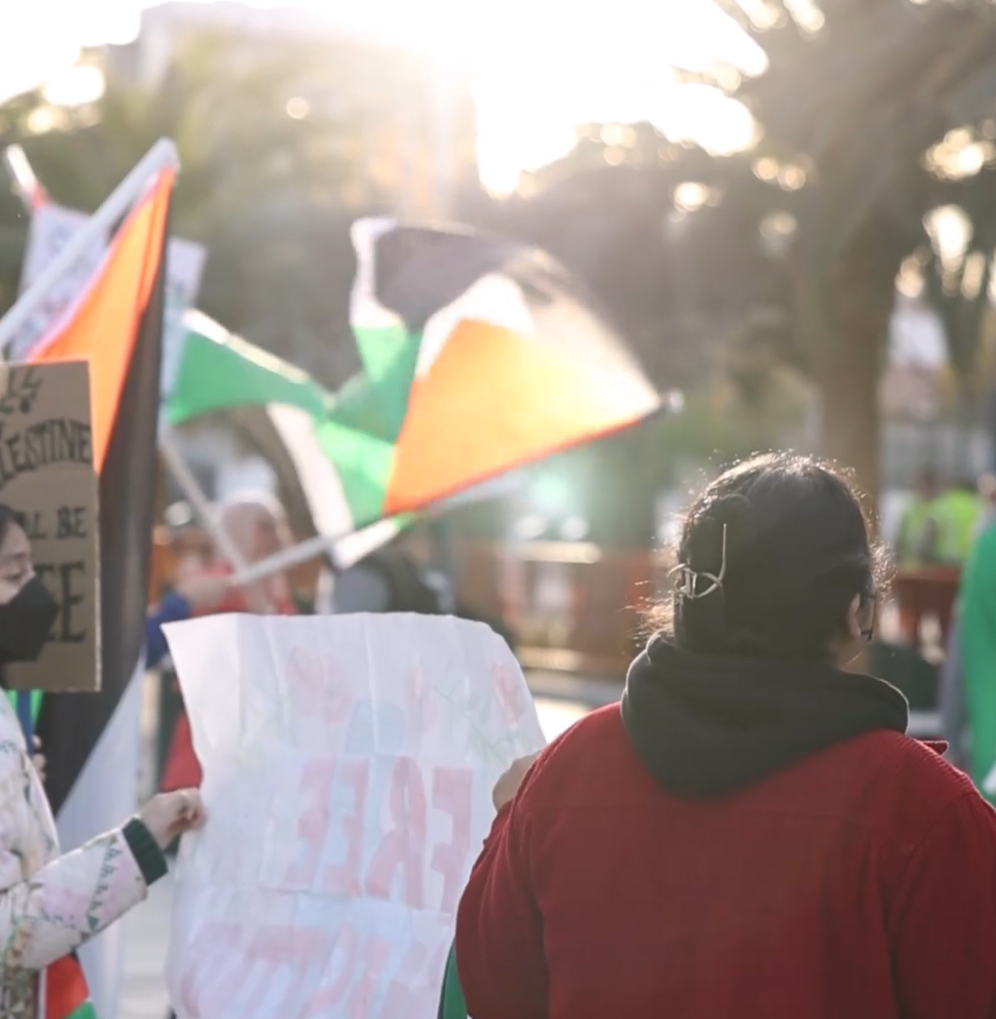
Michael also spoke about the need to keep the conversation going and not lose that momentum about calling for a permanent ceasefire and Palestinian liberation.
“We don’t want it to be a trending thing like in 2021 that just fell off. Yes, we want a ceasefire, but we cannot stop once that happens. Once the violence of bombs dropping stops, the violence continues still,” he said. This was especially true in the days following the interview, as the ceasefire ended on December 1, and Israel continued its unrelenting strikes on Gaza. According to the Palestine Chronicle, “The Palestinian Health Ministry in Gaza announced on Sunday that more than 700 Palestinians were killed in the past 24 hours, as a result of Israel’s ongoing aggression on the besieged Strip, Al-Jazeera reported”.
Still, Michael remains hopeful about the shift in the global response to the genocide in Gaza.
“This time feels different; the world is finally waking up,” he said. “I’m seeing things we’ve never seen before like mainstream media finally challenging their guests and younger generations getting their news from places other than CNN or MSNBC. It’s a sign of things changing.”
Nevadans for Palestinian Liberation: Their Work Post-October 7
Holding Weekly Protests
While fighting for Palestinian liberation is a decades-old fight, the events of October 7 brought the horrors of what has been happening in Palestine for decades to light. In response, NPL has worked harder than ever to raise awareness.
“Sunday [the 26th] was our seventh protest. We’ve also hosted a few community events, like online teach-ins and film screenings,” Michael said. “Protests take a lot out of our group, and since it’s a small community to draw from that supports us, we try to host other events to avoid burnout. The most important thing is about being out there and creating awareness.”
As the genocide in Gaza continues, Michael said that the goal is to host one protest a week while the violence continues. “That remains top of the line,” he said. At the time of that seventh protest that NPL held, the organization had upheld that goal by holding a weekly protest since October 7.
Other Community Events
To reach additional people and help protesters avoid burnout, NPL hosted a teach-in educating the community on December 3.
“We [held] a teach-in on political education, as well as police training that shows the connections between police here and the IDF, and we provided safety training for protesters,” Michael explained. “We need to organize people better, ensure our supporters’ safety, and educate them on how things are connected. We’ve had four people brutally arrested at our protest on Sunday [the 26th] and are still dealing with the ramifications of that.”
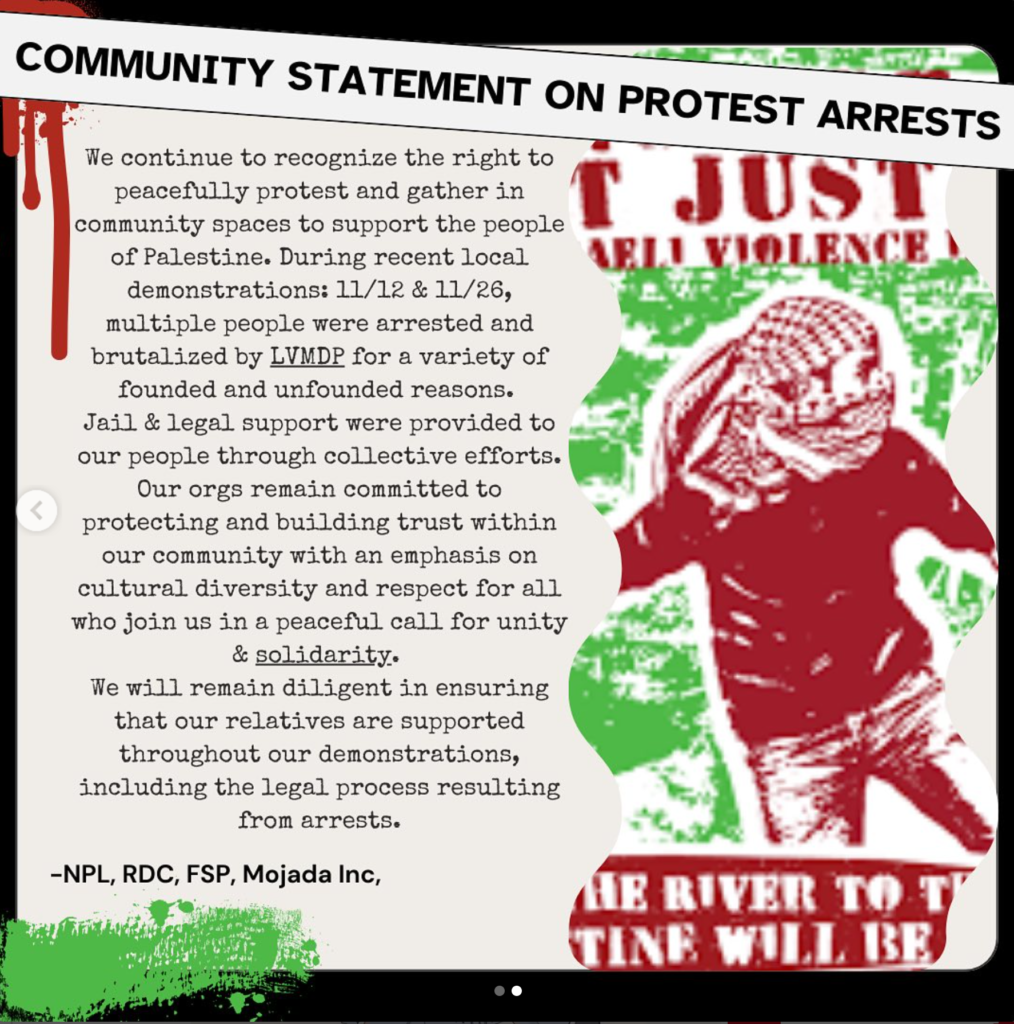
Michael shared that police released the last protester they arrested from jail after holding them for 33 hours. He then explained the treatment by police towards NPL and protesters.
“Police actively work to suppress our level of protesting and put fear into the community. We’ve been out for seven weeks strong, and there are always dozens of police at our protests. They even have snipers and dogs pointed at us,” he said.
“At one of our protests, we made props of dead babies with shrouds covering them to symbolize the children killed in Gaza,” he added. “As a result of this demonstration, one of our people got snatched by police.”
Michael also said that people make assumptions about the people attending protests when they’re just regular people from the community calling for the violence to end.
“We see regular 20- and 30-year-olds, families with babies in strollers, and even grandparents,” he said. “There’s diversity across our group with backgrounds and religions. And they’re all just people standing there for humanity and for Palestine.”
Next NPL Event
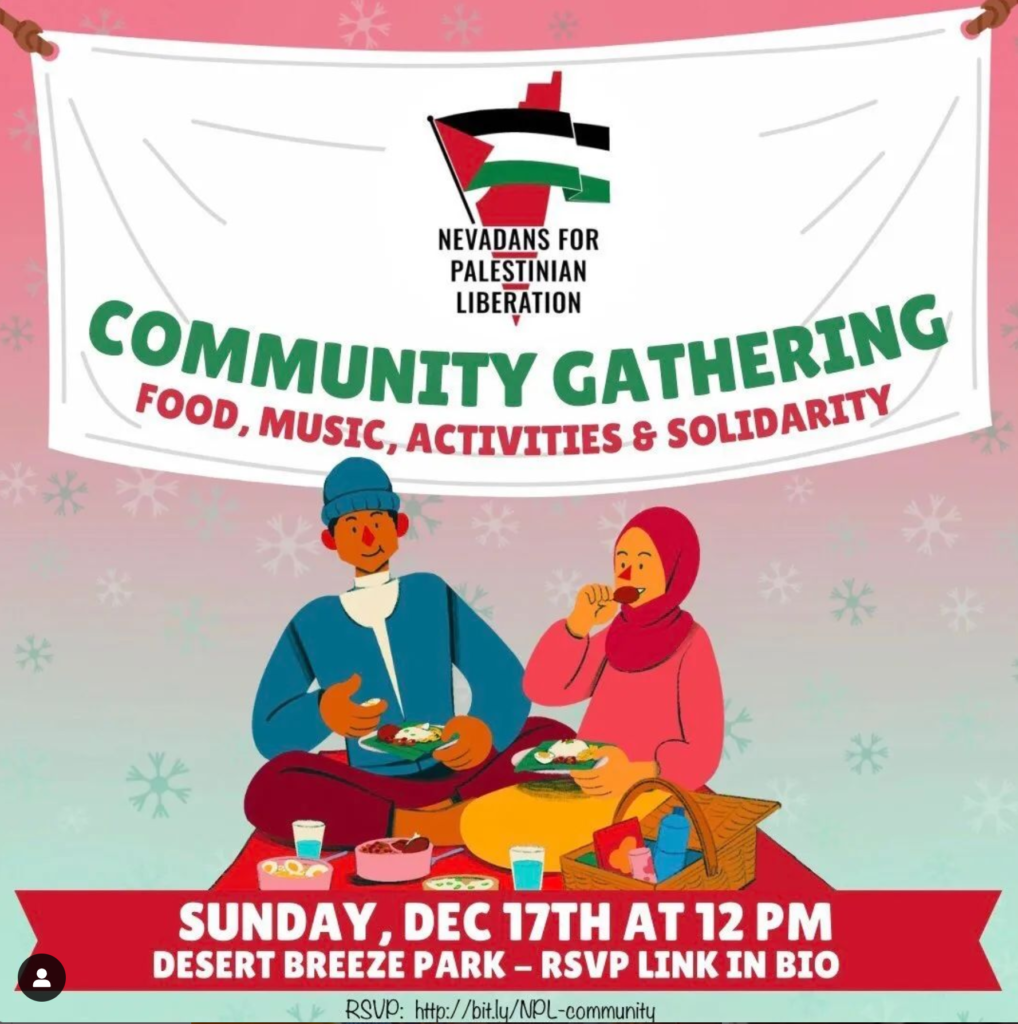
Join NPL at their next event this Sunday at noon for a community gathering featuring food, music, activities, and solidarity! RSVP here for this upcoming event at Desert Breeze Park. Exact location given with RSVP.
Per the event post: “This is a casual gathering to be in a safe space [and] share energy & passion towards collective building through culture and solidarity. Families [are] encouraged to come out!
We are taking this time to bring us all some grounding, [giving us] a chance to live in the moment as we keep mobilizing for total liberation. With recent events, our community continues to carry heavy hearts, but with continued efforts, we will lift each other to resist and reclaim.
Food, music, activities (art projects & games), good people. Please feel free to bring anything to share, from food to art supplies. We appreciate any contributions to our cultural sharing.”
(Article continues after the ad)
Please follow our fantastic site sponsors!
Challenges Nevadans for Palestinian Liberation Faces
Vegas Demographics
Michael said that a big challenge for Nevadans for Palestinian Liberation is that Nevada, and especially Las Vegas, has a low population of Arab and Muslim people living here. In addition, Vegas is also historically a Zionist-heavy town.
“Here we have the influence of Sheldon Adelson, who was a major donor to Israel,” Michael added. Between his ownership of the Venetian and the Review-Journal, his influence remains heavy on the city, even after his death. “Even interfaith organizations like Jewish Voice for Peace were blocked from temples in town.”
The Media’s Response
Michael also shared some of the group’s experiences as of late with the way the media has responded to their protests.
Between protesters and NPL representatives, Michael included, local media outlets have repeatedly cut things out that people they spoke to said, misconstrued their quotes, and even chose not to air the interviews they conducted with them.
“I’ve spoken to reporters who ensured me that my interview was going to air, even gave me the time slot to watch it, and then it never aired,” he said. Even when outlets do share his statements, Michael reported that they’ve taken his words out of context. As a result, he now limits who and what outlets he speaks to.
The Situation Regarding the UNLV President’s Statements
Whitfield’s Statements
On October 11, UNLV President Kieth Whitfield released a statement to the university that condemned Hamas, mourned those killed in Israel, and acknowledged “the pain, despair, fear, and suffering” UNLV community members are feeling at their deaths.” He notably made no mention of the Palestinians killed in that same time frame nor expressed grief over their loss.
Whitfield then made another statement on November 20, wherein he acknowledged that he “[recognizes] that Muslims face discrimination and are victims of violence in our country.” However, in his latest statement on the matter, he again failed to acknowledge the genocide in Gaza and the thousands of Palestinian lives lost. NPL has since responded to this lack of acknowledgment.
NPL’s Open Letter
In an open letter published by the Nevadans for Palestinian Liberation UNLV student chapter, they called for a response by the president to address the ongoing genocide. In the open letter, the call to action states:
“We, the students, faculty, and community members of UNLV, call urgently for you to make a statement regarding the ongoing genocide of Palestinians… We, the undersigned, note acutely that you have not released a similar statement mourning those killed in Palestine. Already by the writing of this letter, over 13,000 people, over 40% of which are children, have been killed inside Occupied Palestinian Territory.”
In addition, the letter states:
“We know that you would never intentionally undermine UNLV as a space that values its diverse community, the diverse perspectives and experiences we bring, and the critical dialogue this creates. We, the undersigned, therefore, urge the following concrete steps to restore these values to UNLV:
- Make a written statement explicitly acknowledging the more than 13,000 Palestinians killed since October 7th and the pain it’s causing in our community.
- Make a written statement on behalf of UNLV calling for a ceasefire and restoration of humanitarian aid.
- Make a written statement condemning the doxxing or leaking of personal information for students and community members who express pro-Palestinian sentiments.
- Meet with delegates of the undersigned students, faculty, and community members to discuss how UNLV can better provide a more supportive and inclusive campus at this time.”
The letter remains open for people to sign with the option to sign anonymously, given the recent doxxing of college students calling for a ceasefire. The group requested a response by December 4, but President Whitfield has yet to issue a statement as of this posting. If you’re affiliated with UNLV and want to sign the letter, sign it here.
Influence by AIPAC
Another challenge that pro-Palestine organizations like Nevadans for Palestinian Liberation face is how much AIPAC influences politicians in our country.
AIPAC, the American Israel Public Affairs Committee, is a lobbying group that advocates for pro-Israel policies to the legislative and executive branches of the United States. In the 2022 midterms alone, AIPAC ranked first in donations to the United Democracy Project, a pro-Israel super PAC, donating $10.5 million.
According to Open Secrets, AIPAC donates millions of dollars to both Democrats and Republicans, including “Republicans that have cast doubt on the legitimacy of the 2020 presidential election.” Moreover, Open Secrets also reported that AIPAC also donated to the campaigns of all but one of the twelve Republican cosponsors of the censure [of Rashida Tlaib].
On AIPAC’s candidate portal, they encourage donations to politicians who are pro-Israel. This includes familiar faces like NV Senator Jackie Rosen and NV Representative Susie Lee (who also voted to censure Tlaib) to the newest House Speaker, Republican Mike Johnson, who faces “scrutiny for ties to far-right Christian movements.” (NPR)
The Potential Fall Out After Recent Congressional Hearings
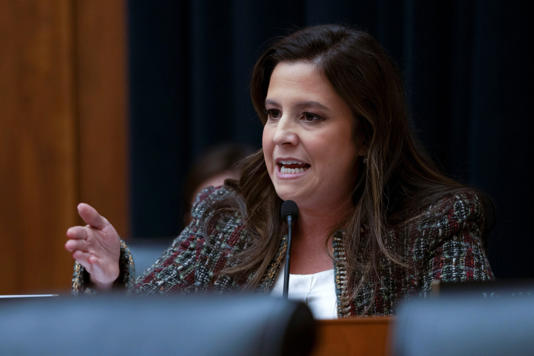
Facing an organization with this level of government influence like AIPAC poses a daunting challenge to NPL. A most recent example of this includes the recent congressional hearing where Republican Representative Elise Stefanik (R-N.Y.) questioned university presidents about their school’s code of conduct regarding calls for genocide.
A noted problem about her examination of those presidents is that she demanded a ‘yes’ or ‘no’ response to a question preceded by Stefanik’s interpretation of the phrase, ‘intifada.’ While the word intifada translates to “a rebellion, uprising, or resistance movement,” Stefanik claims it’s interpreted as inherently antisemitic and calls for the genocide of Jewish people. Based on this definition, Stefanik asked each of the university presidents “if calling for the genocide of Jews violated the schools’ codes of conduct.”
Because of the way Stefanik proposed the question, the university presidents responded by saying that the schools’ responses to situations like those is “context-dependent decisions.” This response led to claims that the presidents evaded the question and are antisemitic themselves.
However, as many have noted, Stefanik is a far-right Trump ally herself, is AIPAC-endorsed and has her own ties to antisemitic and racist rhetoric, including pushing the “great replacement theory.”
Since the hearing, Penn State University President Liz Magill resigned following the backlash. There are calls for all the others to resign, and a discussion about limiting freedom of speech on college campuses has gained traction.
For student-led organizations like NPL, the future is uncertain regarding whether schools will strip free speech and the right to protest from them due to these hearings.
Misconceptions – Assumptions of Antisemitism
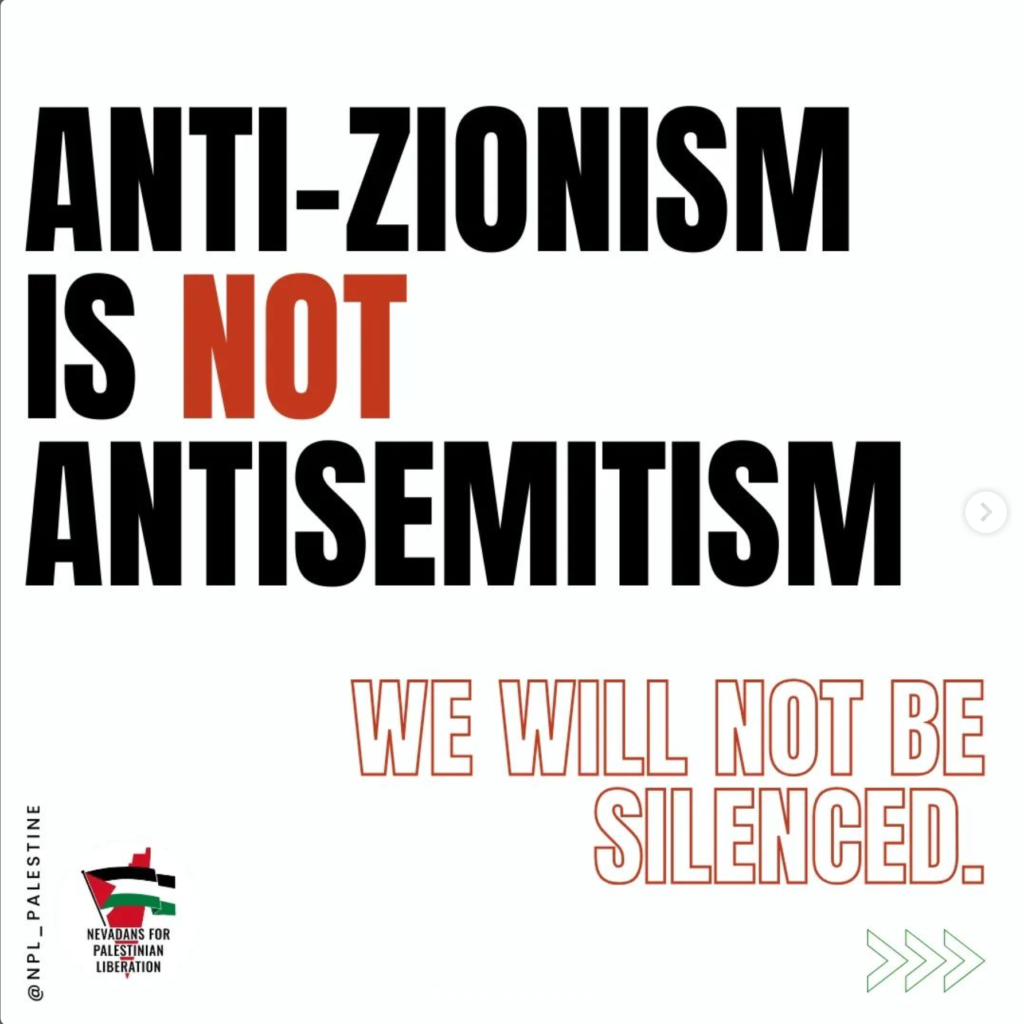
Michael also discussed the misconceptions that he and NPL have faced in the past and recent weeks regarding the organization and the situation in Palestine.
“When people see you stand with Palestine, the rhetoric is that you are a terrorist, a terrorist sympathizer, or antisemitic,” he said. “And on the topic of antisemitism, we are adamantly against antisemitism; there’s no place for it in any Palestinian solidarity movement… The word is often used as a suppression tool to make people unfamiliar with our foundation of belief believe that criticism of Israel or their Zionist project is antisemitic. And by calling any criticisms of Israel ‘antisemitic,’ governing bodies like universities or government institutions use this definition to claim people are engaging in antisemitism when being critical of the Israeli government.”
In the process of this, Michael said it ends up muddying the waters and making people afraid to speak out for fear of being called antisemitic. And, with the heightened misuse of the word, legitimate instances of real antisemitism go ignored, too. For example, while the government has been targeting colleges for students protesting the genocide and businesses have fired people who’ve called for a ceasefire, neo-Nazi groups have held marches in rallies calling for the death of Jewish people, with no pushback or repercussions.
Misconceptions – Justifying Resistance
Michael also explained another misconception about the lack of knowledge regarding the justification for resistance.
Per the United Nations General Assembly (UNGA) Resolution 3314 in 1974, which determined the “Definition of Aggression,” the resolution “affirmed the right of self-determination, freedom, and independence for all “peoples under colonial and racist regimes or other forms of alien domination,” and affirmed the “right of these peoples to struggle to that end and to seek and receive support.” (CJPME)
Furthermore, UNGA Resolution 37/43 (1982) reaffirmed the “inalienable right” of the Palestinian people “and all peoples under foreign and colonial domination” to self-determination. It also reaffirmed the legitimacy of “the struggle of peoples for […] liberation from colonial and foreign domination and foreign occupation by all available means, including armed struggle.” (CJPME)
Michael explained that, by these definitions, Palestine is an occupied land occupied by Israel, and as such, Palestinian people are legally allowed to resist that occupation by any means necessary.
“Resistance is justified when people are occupied,” he said. “Those kids in Gaza who grew up to become fighters for Hamas and other resistance groups came from this conflict; they had to live through multiple wars and apartheid, and watched their homes be destroyed and their families killed or imprisoned. They don’t come from other countries to fight. Yet the IDF gets people from the US, Europe, and Australia to fight for Israel.”
Begging the question of if you would fight to defend your family and your country from an occupying force, Michael said, “Who are we, sitting in our privilege, to condemn others for their resistance?”
(Article continues after the ad)
Please follow our fantastic site sponsors!
The Debate Over the Phrase “From the River to the Sea, Palestine Will Be Free”
Touching on the debate over the meaning of the phrase, “From the river to the sea, Palestine will be free,” Michael discussed what it means to the NPL.
“When we say we want to liberate Palestine, or that Palestine will be free, we want it to be one state for all to live in peace and with equal rights,” he said. He further explained that the interpretation that they want to push the Jews to the Mediterranean Sea or kill all Jews is a gas-lighting scare tactic to make people think anyone who says this phrase is antisemitic. “Our sense of liberation is not about eliminating Jews.”
Michael went on to explain that, in actuality, claiming this phrase calls for the death of Jewish people is a Zionist projection.
“Their whole idea of Zionism with the settler colonial project is to eliminate Palestinians from their Indigenous land,” he said. “Lots of things we see lately involve this idea of being a victim, with Israel using propagandized horror stories of tactics that they actually used against us. These claims of babies being baked or beheaded, and other claims they’ve made, have been happening to Palestinian people for decades.”
A Hypocrisy of Care and Ethics
As a stark example of these projected reports, Israel recently reported that Hamas soldiers raped and sexually assaulted multiple women and children since October 7. Rape and sexual assault are categorically condemnable and inexcusable in all instances, no matter what. This is why it is appallingly hypocritical that Israel is propping up the sexual assault of Israeli women and children as propaganda to justify the genocide in Gaza, while IDF soldiers have reportedly done the same to Palestinian women and children for decades without repercussion.
It’s reasonable to assume that a country that propagandizes the sexual assault of its own citizens to justify genocide while ignoring sexual assault carried out by its own military doesn’t actually care about rape or sexual assault, ethically speaking.
So when people say, “From the river to the sea, Palestine will be free,” it involves the liberation of Palestinian people from the violent oppression and occupation brought on by the Israeli government throughout its 75-year history, not the Jewish people as a whole.
Yet, because the Anti-Defamation League declared this phrase inherently antisemitic and believes anti-Zionism to be the same as antisemitism, anyone saying the words or supporting Palestinian efforts is assumed to be antisemitic.
While its word on the matter is taken as uncriticized fact, the ADL has reportedly “branded itself as a civil rights organization in ways that conceal and legitimize its right-wing activities undermining the rights of Black, immigrant, queer, Muslim, Arab, and other marginalized communities.”
A Brief History of Zionism and How It Led to the Establishment of Israel in Palestine
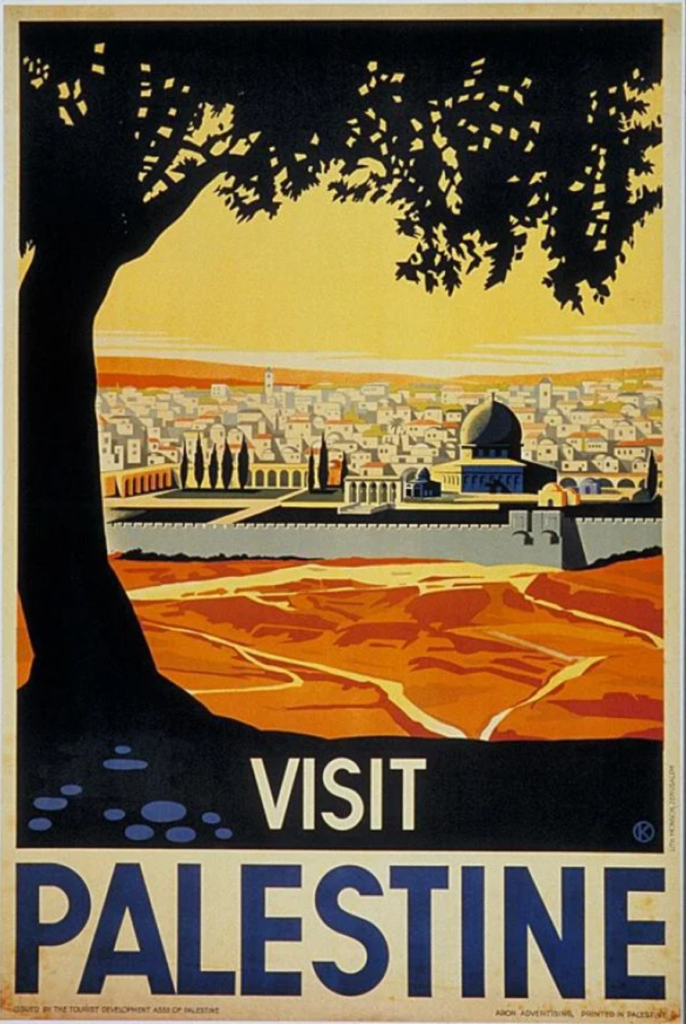
Before the founding of Israel in 1948 and the implementation of Zionism, history shows that everyone lived together in this region in peace. Established in 1887 as a political organization and movement to develop and protect a Jewish nation, Zionism is a form of Jewish nationalism with a basis to establish a Jewish ethnostate within Palestine.
The colonization of Palestine started in 1917 with the Balfour Declaration, a public statement issued by the British Government during World War I, announcing its support to establish a “national home for Jewish people” in Palestine. After this declaration, the British Zionist Federation began to draw lines in the sand and separate parts of Palestine.
“Zionism is basically a political ideology built on settler colonialism and white supremacy. It has nothing to do with religion,” Michael said. “Through co-opting Judaism and attracting Jewish people to settle in Palestine, the Zionist plan involves creating Jewish states around the world. It uses the concept of the Holy Land as a marketing tool.”
Michael then pointed to a 1936 historical poster marketing Palestine to Jewish people as this place that was a barren land before Jewish people lived there. This ultimately worked to erase thousands of years of Palestinian history while encouraging Jewish people to settle the land.
About the Ongoing Genocide in Gaza
The Current Numbers – A Devastating Loss of Life
The current state of the ongoing genocide in Gaza has escalated rapidly over the past two months and even more so in the past couple of weeks. At the time of this initial interview, Israeli airstrikes already killed more than 13,000 Palestinians. Nearly half of those were children, most under five years old. That number has since risen to approximately 18,000 people. When you read this, it will be even higher as the number climbs.
In addition, according to the Committee to Protect Journalists (CPJ), “As of December 11, CPJ’s preliminary investigations showed at least 63 journalists and media workers were among the more than 19,000 killed since the war began on October 7—with some 18,000 Palestinian deaths in Gaza and the West Bank and 1,200 deaths in Israel.”
Moreover, NPR reported that “The [CPJ] says the Israel-Gaza war has “led to the deadliest month for journalists” since it started gathering data in 1992.”
In addition, journalists have seen their family members killed in missile strikes, attacked, arrested, threatened, and censored in retaliation and intimidation for their reporting about what’s happening in Gaza.
The Recent Temporary Ceasefire and Release of Hostages
Over Thanksgiving week, a temporary four-day ceasefire started and extended another couple of days. Of note, however, while the ceasefire was in place in Gaza, Israel reportedly continued bombing other areas, including the West Bank, Syria, and Lebanon.
During the ceasefire in Gaza, a three-to-one transfer of hostages from both Hamas and the Israeli government. Many of the Palestinian prisoners released were women and children, some of whom were very young when arrested and held prisoner in Israel for years.
“The world seems to have just found out that there are thousands of kidnapped Palestinian hostages held in Israeli prisons,” Michael said. He added that while Israel released 150 Palestinian hostages, the IDF kidnapped an additional three to four thousand in that same time to replace those released from the prisons. In addition to the thousands of Palestinians newly kidnapped by Israeli forces, thousands of Palestinian workers in Israel have gone missing since October 7.
“It’s suppression tactics like this that have become a part of Palestinian life,” Michael said. “Everyone in Palestine knows someone in these prisons. People, [even kids], are taken for things like throwing rocks. Posting or liking pro-Palestinian content gets you a visit by the police or the Israeli military and thrown in jail. All for simply existing on your land and defending it.”
The Response to Resistance
Given the resilience of the Palestinian people, Michael explained how the only way for the settler colonial project of Zionism to continue is by removing Palestinians from their indigenous land. This means that on top of the general ethnic cleansing, it involves throwing people into prison, especially for speaking up about the occupation.
“I ask you, what else can people endure? If you resist, they call you a terrorist; if you advocate through a boycott like the BDS movement, they call you antisemitic. All while we watch medics, journalists, and kids being killed,” Michael said. “Here in the US, 32 states have passed laws that if you want to do business with the state, you agree not to boycott Israel. Which violates free speech and is unconstitutional.”
Michael then explained that the power of boycotts was one of the essential tools for bringing down apartheid in South Africa.
“Israel will not give the land back on their own, so the rest of the world has to put that pressure on them,” he said. Part of that pressure also involves the powers that be in the UK and the US stopping their endorsement and funding of the genocide as well.
Israel Backtracking on Claims
Since October 7, the Israeli government has walked back specific claims it initially made and has also been reported to have shot at their own citizens at the festival on October 7.
One such claim Israel walked back was on the reports of Hamas beheading babies. According to CNN, “The Israeli government has not confirmed the specific claim that Hamas attackers cut off the heads of babies during their shock attack on Saturday, an Israeli official told CNN, contradicting a previous public statement by the Prime Minister’s office.”
In addition, Haaretz, an Israeli newspaper, reported that “an Israeli police investigation into the music festival massacre on October 7 indicates that the IDF mistakenly shot some festival attendees while firing at Hamas.”
And, after claiming that a calendar inside a Gazan children’s hospital was a list of Hamas hostage guards, Israel blamed a “translation error” for the claim. This after “several journalists and native speakers on social media pointed out that the written Arabic words on the calendar were only identifying the days of the week.”
Contradictions like these highlight the need for journalists covering the genocide to question Israel’s use of propagandized stories, omissions of facts, and false claims. Many mainstream journalists and news outlets continue to report what’s happening uncritically and without context or verification. And with governments using these claims to greenlight Israel’s actions in Gaza, it’s all the more alarming that so much information goes unverified when endorsing or funding those actions.
That’s why following journalists and Palestinian voices reporting directly from Gaza is essential.
Nevadans for Palestinian Liberation in the Community
In addition to supporting Palestinian voices, NPL partners and forms relations with many other local community groups that share collective causes like Indigenous liberation or work on by-proxy issues like worker’s rights. This includes groups familiar to our readers, like Fifth Sun Project, The Solidarity Fridge, Vegas DSA, and More Than a Hashtag.
Michael also mentioned the Red Desert Collective, an organization that advocates for “workers’ rights, unions, and the working class, as well as educating people about the system of government we have and how we need to make an alternative to have a functioning society.
“Whether it’s anti-cap, socialist, anti-imperialism – these issues, like working class and indigenous rights, are tied together. Our struggles are connected,” Michael stated. “When people realize that, that’s how you build a movement to educate about the connected struggles. That’s how we build for the future.”
#GetinMotion with Nevadans for Palestinian Liberation
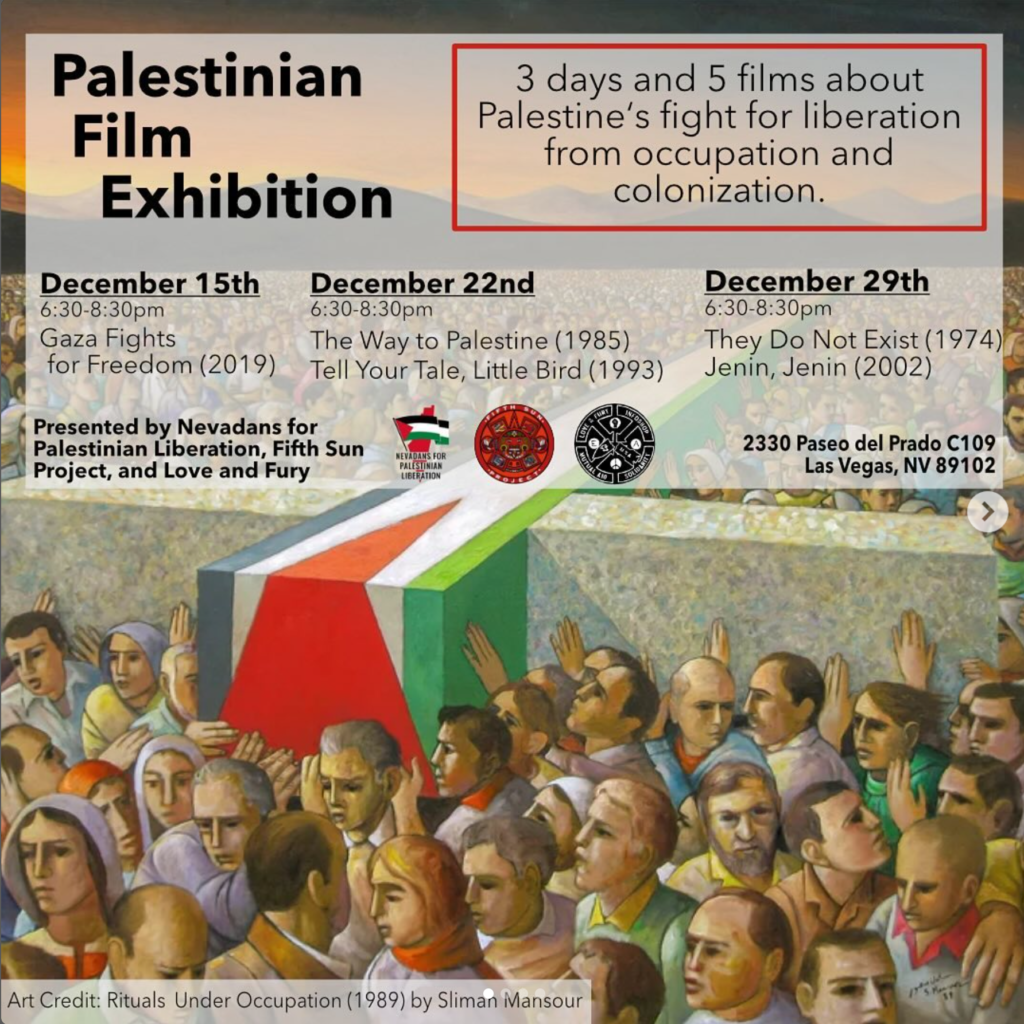
Follow Nevadans for Palestinian Liberation and Attend an Event
Those wanting to learn more about Nevadans for Palestinian Liberation follow the organization’s Instagram and the UNLV Chapter’s Instagram. Visit NPL’s Link Tree to see upcoming events or protests, browse resources and educational sources, and see opportunities to take action to stop the genocide in Gaza. Watch for NPL’s events to learn more about Palestine, like teach-ins, study groups, and film screenings.
Donate to Nevadans for Palestinian Liberation’s Mobile Truck Campaign
NPL recently started a mobile billboard truck campaign to raise awareness about the genocide. The truck travels along the Las Vegas Strip, featuring a one-minute-long video of graphics to educate people passing by and increase exposure to the issue. Donate to the campaign here.
Keep Talking About Palestine and the Genocide in Gaza
Michael also said, “The best thing that is happening to Palestine right now is the presence of social media.” As such, people can support Nevadans for Palestinian Liberation and Palestinians in general by continuing to talk about Palestine, sharing stories online of people in Gaza and the West Bank, and talking about it in their circles at school or work and with their family, friends, and neighbors.
“Palestinians are not gonna liberate themselves against Israel,” he added, relating back to the endorsement and funding of Israel’s occupation by the US and UK. Furthermore, he said that Palestinians will continue to resist as much as possible and have been for 75 years, but having people apply pressure on institutions to make a change is what’s going to shift the balance.
Learning More About The History of Palestine
Lastly, Michael suggested some resources for people to learn more about Palestine’s history, stay updated on the genocide in Gaza, and gain more understanding about the history between Palestine and Israel leading up to current events.
- Follow Palestinian voices creating content and reporting the news on the ground;
- Listen to The Electronic Intifada’s daily live-streamed coverage on YouTube. Starting on October 7, it goes live daily at 9 AM PST to break down everything on the ground, providing updates and analysis, interviewing people in Gaza, and more;
- Comprehensive Palestine Solidarity Actions and Resources (DSA);
- Read Palestinian literature, like ‘Palestine: A Four Thousand Year History’ by Nur Masalha.
Closing Thoughts
Some of Michael’s last comments emphasized the importance of people uniting and standing for what’s right.
“When you hear the phrase, ‘The people united will never be defeated,’ it’s about the people coming together,” he said. “I’ve always said that Palestine is a litmus test on your morality; Where you stand with Palestine is what kind of person you are.”
Thank you to our supporters and sponsors!
As always, we want to thank our Patreon ‘Cultivator’ supporters and sponsors who help make our content possible.
The following Patron(s) supported the production of this article:
Crystal Gropp
The following sponsors supported the production of this article:
Viva La Compost & LunaKai Lash

